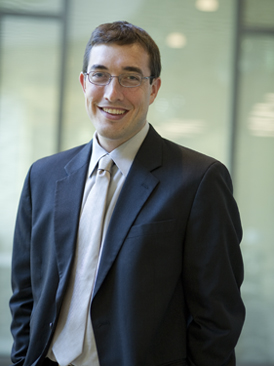

Straight out of Williams College with a bachelor’s degree in economics, Christopher Warshaw landed a job studying the costs and benefits of environmental rules at a consulting firm in Cambridge, Massachusetts. What he learned there would forever change the course of his career and his outlook.
“What struck me during that work is it generally wasn’t the cost and benefit analysis driving environmental policy decisions, it was aspects of the political process,” Warshaw said. He had planned to go back to school to complete his environmental economics training. “But through my experience at the consulting firm, I decided that wasn’t really where we needed progress. Instead, it was important for me to understand more about how the political system works in order to do research that could positively change the world.”
Specifically, Warshaw was driven by the issue of climate change.
“Climate change is this enormously important challenge,” Warshaw says. “How we should confront that challenge and what our energy mix should look like to address it—while also enabling the economy to keep going and enabling people to have affordable power—is complicated. I think good people can disagree on the details, but it’s just enormously important for our society to face up to this challenge.”
After working a couple years on political campaigns—further providing him with context on how the system works in order to tackle that challenge—Warshaw went to Stanford for his PhD in political science. Now an assistant professor at MIT, Warshaw continues to ask: What is it that causes us to end up with the types of policies we have? How well do those policies represent what the public wants? And, to be effective citizens, how can we make a difference?
What he’s found in his research has been stark, though perhaps not surprising.
“One of the theories that interest groups operate under is that if they can change public opinion on an issue, then that eventually should drive legislators or elected officials to take action,” Warshaw says.
“It turns out that it takes vast shifts in public opinion—with about 80 percent of the public supporting a position—to motivate legislators to vote against their partisan priorities.”
Warshaw gives an example. In 2008, when Congress voted to bail out the auto industry, conservative Michigan Republicans voted for it because the vast majority of the public in Michigan—largely made up of auto workers and their families—supported it.
Warshaw has seen similar results at the local level, and drilled down to see if different institutions—direct democracy, term limits, city managers versus elected officials, etc.—make governments more responsive to public opinion. While unfortunate, he found such institutions didn’t seem to make much difference.
Next, Warshaw is working to draw a connection between public opinion and roll call votes at the state level. One of the motivations for this work is that “there are a lot of great environmental and energy policies that one could do at the local level,” Warshaw says.
One of the first state policy areas he plans to explore is renewable energy policy. But to do this, he needs data, and at the state and local level there are virtually no surveys of public opinion on environment and energy. So he’s running the original surveys himself—starting with opinions on renewable energy, but later he plans to expand to other topics like hydraulic fracturing.
“One would expect that because a state like Wyoming depends so heavily on the coal industry the people from that state would be very pro coal. But we don’t actually know if that’s the case because nobody’s ever asked,” Warshaw says. “This is information we need to stop assuming we know.”
Once Warshaw has data on public opinion, he’ll compare that to the data he and his graduate student are collecting on roll call votes in state legislatures.
“This will help us figure out if public opinion actually matters at that level because if you’re a state legislator it’s not obvious you would even know what the public opinion is,” Warshaw says.
He explains that this is important information to know not just because legislators should take public opinion into account when voting, but also because if you’re trying to persuade people to change their minds by knocking on doors and running ads, making calls, etc. “In the end, if the legislator doesn’t know that the public’s mind has been changed it doesn’t matter,” he says.
Warshaw doesn’t pretend to have all the answers, but he does want to find out how the political process works and how it can be influenced in part to pass this knowledge on to his students, who collectively someday could have the answers.
“The students here are brilliant. They’re going to go out and try to find solutions to real problems. It’s just part of the engineering mindset,” Warshaw says. “But we also need to make sure they understand the complexities and nuances of environmental and energy policy.”
That means, according to Warshaw, making sure they understand more than just their small part. They need to understand the big picture and how other aspects of the process influence their work.
“It’s really important for students to be exposed to a wide variety of the liberal arts and different perspectives,” Warshaw says. “If we give them the right training, my experience is that smart people can rise fast and I believe they can really make a difference in the world very quickly.”

